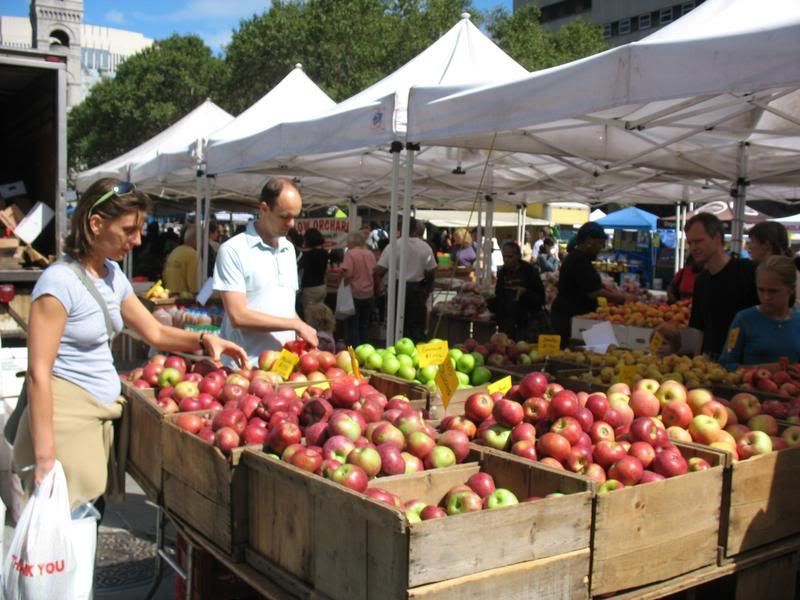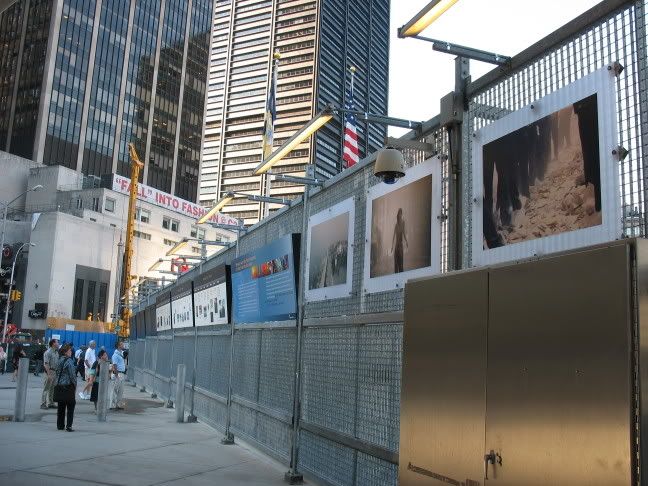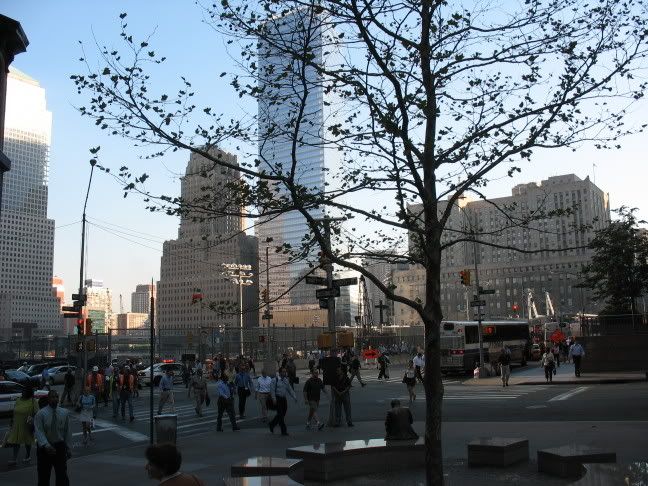
Wednesday, September 20, 2006
Sunday, September 03, 2006
9/11 and people on the streets of Brooklyn(School assignment)
Even if they lived outside of New York City at the time, passers by on Brooklyn streets felt their lives influenced by the terrorist attacks of 9/11. The six people I interviewed on a rainy day in late August almost five years after the attacks said that the possibility of another terrorist attack was on their minds. But they still felt safe in Fort Greene, the multicultural neighborhood of charming brownstones and abundance of greenery.
“My sister picked up smoking,” said Jeremy Wooster, 19, of Canarsie, when asked about 9/11 and its influence on his life. “She was looking for my brother and me that day and couldn’t find us. She didn’t know what else to do.”
Wooster, now a Bard College student, was attending a high school at the time of the attacks just a few blocks from The World Trade Center. His school was evacuated and after four days off, he and his schoolmates were for a month sharing a high school in Brooklyn. “The Brooklyn kids hated having us there. It was a bad experience. They should have given us more time off,” Wooster said. Now working at the Jewish Heritage Museum, he still visits Ground Zero often and is not happy about what he sees. “The small businesses are all gone. The places we used to go for lunch, they are all gone.”
“Tourists coming to Ground Zero really bother me,” Wooster added.
“It’s a huge graveyard really. Thousands of people are buried there and [tourists] come to take a picture. It angers me. I think it’s creepy.”
Sunny Kim, 30, of the Lower East Side, lived and went to school near Ground Zero in 2001. After September 11, she quit her job and moved out of the city. “There were other reasons for me to leave as well,” she said, smoking a cigarette outside a Laundromat. “I have never been to the site,” Now working as a teacher, Kim said. “I have people who come visit me and they say, ‘Hey, let’s go!’ and I just say, ‘Here is a map, you go.’ I can’t. I just can’t. And I am not a very emotional person.”
Meg Forbes, a retiree of Fort Greene heard about the first plane crash on the radio and thought that it was a “bad joke”. Later, when her sister called, she looked out the window and saw the smoke coming out of the tower. “I sat in my chair and I stayed in that chair until about 6 in the evening. I called everybody I knew,” she said.
Forbes attended a jazz concert at the World Trade Center the Friday before the attacks. “I was looking at all those pretty young girls and I thought to myself, wouldn’t it be nice to be this young, work in this beautiful building and make all this money. And look at it now, it’s all gone,” she said. When asked how 9/11 influenced her life, Forbes said, “Not a day goes by that I don’t think about it. I look out the window and see the empty space where the towers used to be. You wanna know how it influenced my life? I tell you. It made me miserable!”
Despite her strong emotions, Forbes is now able to travel around Downtown Manhattan. “I take the bus and look at the construction from the window. I hear there is an exhibit there now. I decided to go see it,” she said.
The majority of people interviewed expressed that they don’t feel safer seeing police with machine guns around the city and in subway stations. “I think the money spent on manhours of all those cops standing around chatting, could be better used,” Wooster said, adding that another attack on New York City would not surprise him.
Even if they lived outside of New York City at the time, passers by on Brooklyn streets felt their lives influenced by the terrorist attacks of 9/11. The six people I interviewed on a rainy day in late August almost five years after the attacks said that the possibility of another terrorist attack was on their minds. But they still felt safe in Fort Greene, the multicultural neighborhood of charming brownstones and abundance of greenery.
“My sister picked up smoking,” said Jeremy Wooster, 19, of Canarsie, when asked about 9/11 and its influence on his life. “She was looking for my brother and me that day and couldn’t find us. She didn’t know what else to do.”
Wooster, now a Bard College student, was attending a high school at the time of the attacks just a few blocks from The World Trade Center. His school was evacuated and after four days off, he and his schoolmates were for a month sharing a high school in Brooklyn. “The Brooklyn kids hated having us there. It was a bad experience. They should have given us more time off,” Wooster said. Now working at the Jewish Heritage Museum, he still visits Ground Zero often and is not happy about what he sees. “The small businesses are all gone. The places we used to go for lunch, they are all gone.”
“Tourists coming to Ground Zero really bother me,” Wooster added.
“It’s a huge graveyard really. Thousands of people are buried there and [tourists] come to take a picture. It angers me. I think it’s creepy.”
Sunny Kim, 30, of the Lower East Side, lived and went to school near Ground Zero in 2001. After September 11, she quit her job and moved out of the city. “There were other reasons for me to leave as well,” she said, smoking a cigarette outside a Laundromat. “I have never been to the site,” Now working as a teacher, Kim said. “I have people who come visit me and they say, ‘Hey, let’s go!’ and I just say, ‘Here is a map, you go.’ I can’t. I just can’t. And I am not a very emotional person.”
Meg Forbes, a retiree of Fort Greene heard about the first plane crash on the radio and thought that it was a “bad joke”. Later, when her sister called, she looked out the window and saw the smoke coming out of the tower. “I sat in my chair and I stayed in that chair until about 6 in the evening. I called everybody I knew,” she said.
Forbes attended a jazz concert at the World Trade Center the Friday before the attacks. “I was looking at all those pretty young girls and I thought to myself, wouldn’t it be nice to be this young, work in this beautiful building and make all this money. And look at it now, it’s all gone,” she said. When asked how 9/11 influenced her life, Forbes said, “Not a day goes by that I don’t think about it. I look out the window and see the empty space where the towers used to be. You wanna know how it influenced my life? I tell you. It made me miserable!”
Despite her strong emotions, Forbes is now able to travel around Downtown Manhattan. “I take the bus and look at the construction from the window. I hear there is an exhibit there now. I decided to go see it,” she said.
The majority of people interviewed expressed that they don’t feel safer seeing police with machine guns around the city and in subway stations. “I think the money spent on manhours of all those cops standing around chatting, could be better used,” Wooster said, adding that another attack on New York City would not surprise him.
Subscribe to:
Posts (Atom)


